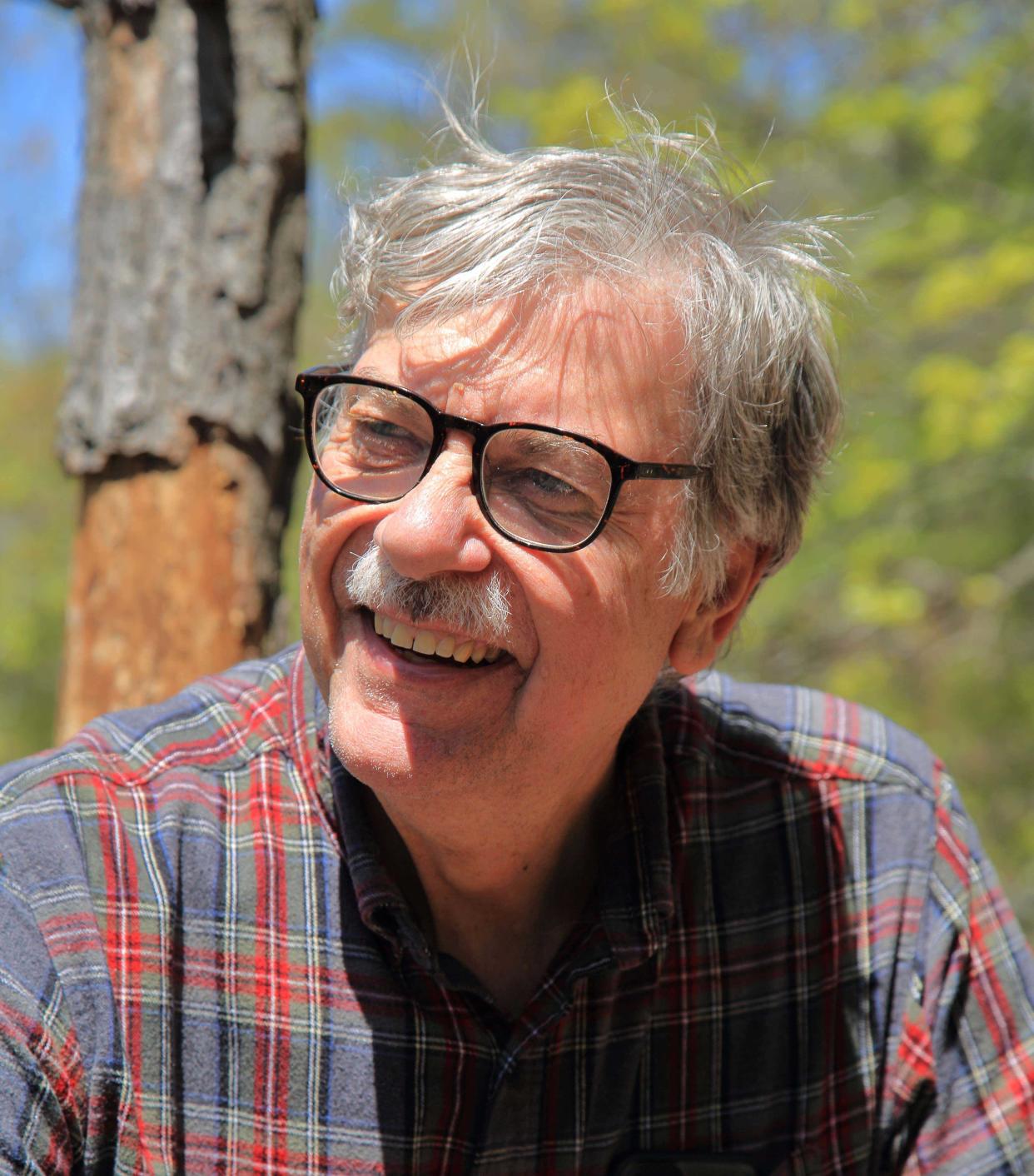How novelist Steve Wiegenstein views America, past and present, through 1904 World's Fair

To better understand what makes America's heart tick, in and out of rhythm, Steve Wiegenstein went to the fair.
The Columbia novelist didn't make some brief summertime pilgrimage, but went back more than a century. To St. Louis, and to trace a path around its fairgrounds that took years to complete.
"If you were to imagine an event that summed up the American experience at the turn of the 20th century, you’d probably come up with something like the World’s Fair," Wiegenstein wrote on his blog.
That seminal event, which indeed summed a moment — and prophesied moments to come — forms the physical and historical center of Wiegenstein's newest novel, "Land of Joys." The book continues one family's story, told over four novels now, spurred by bent-but-never-broken matriarch Charlotte Turner.
"Land of Joys" also, as is Wiegenstein's way, tells a more fathomless story: of America's virtues and sins, of a union that grows both more imperfect and more compelling over time.
A main character for the ages
With "Land of Joys," Weigenstein once again travels alongside Turner, occasionally steering her toward satisfaction or near ruin. The author introduced readers to Turner as a 25-year-old newlywed; manifest in fresh ink, she is now a grandmother. Turner's resilience, expressed in every circumstance, remains the core of these books, Wiegenstein said in a recent interview.
Turner owns impulses toward protecting, and generously giving herself to, the youngest generation of her family, he said.
As the Turner clan winds its way through 1904, Charlotte's son, Adam, writes their Ozarks home into the popular book "The Hill-Billies of Heaven Holler." Converting the book into a 3-D exhibit leads the Turners to St. Louis. There, the family encounters complicated questions of identity and truly visceral threats.
Charlotte Turner's instincts, stirred up here, exhibit the character's continued evolution.
"Through the course of the books, she’s moved from idealism to a very sort of hard-nosed realism," Wiegenstein said. "... She’s no longer as swept away by grand ideas as she was at the beginning. But at the same time, she’s willing to entertain people’s grand ideas."
The author confessed a continued admiration for his central character and, with a laugh, regret at constantly imperiling her. Wiegenstein has grown alongside Turner, he said; writing her through recent political stresses and a pandemic, he's been stripped of lingering naiveté.
"She’s not a cynic, in the sense of scoffing, but she just sizes (people) up much more realistically. And I think that’s probably rubbed off on me some," he said.
"Land of Joys" not only follows the Turners further, but falls in line behind Wiegenstein's only book outside the series. "Scattered Lights," his superlative short-story collection from 2020, made the list of finalists for the 2021 PEN/Faulkner Award in Fiction.
While traveling through "Land of Joys," Wiegenstein tripped over the book's ambitions, its "great themes," he said. Trying to address capital-letter issues of race and other distinctly American concerns can paralyze a writer, he added.
Setting the book aside to finish "Scattered Lights" recentered the deceptively simple place of story.
"If there are themes that emerge, fine. But let the story drive the work," Wiegenstein said of what he learned.
Fair ground for another story

Pop culture shapes our pictures of the history preceding us. No doubt, many prospective readers first attach the 1944 Judy Garland film "Meet Me in St. Louis" to the World's Fair, Wiegenstein said.
Reading deeper histories such as James Gilbert's "Whose Fair? Experience, Memory, and the History of the Great St. Louis Exposition" appropriately complicated his understanding. Designed with a bent toward enlightenment, even individual betterment, the fair exercised another impact on blue-collar visitors, Wiegenstein said.
Impressive exhibits towered over fairgoers, their power explicitly "intended to intimidate you," he said.
"An ordinary person would feel tiny and small" amid great buildings and sculptures, he added.
People left outside the World's Fair formed a disconcerting mirror image with those on display inside. Black Americans were treated as unwelcome, Wiegenstein said; and within the fair, an outsized exhibit dedicated to the Philippines exoticized and dehumanized its residents, rather than celebrated them.
The fair resembled something like a "Roman triumph" with conquered and colonized people on exhibit for white people's watching eyes, he said.
Scrutinizing history, Wiegenstein sees both singular moments and a longer story.
"Writing historical fiction, for me anyway, always seems to reflect onto the present," he said. "'Cause what’s the point if it doesn’t? It just becomes escapism."
A common thread tethers the 1904 World's Fair and America in 2023 — namely, misplaced hopes. In sure ways, modern life outpaces a century ago; yet we still embrace the same utopian ideals, a sense that we can and will recreate ourselves.
"Up until then, most of the utopian mentality was focused on pastoral, agricultural utopia — people retreating from the world to live this sort of imaginary bucolic life," Wiegenstein said. "The World’s Fair was a technological utopia. Now, it’s inventions that are going to solve all the world’s problems. ... And it was a big celebration of the power and mastery of technology."
Just one problem abounds.
"And of course, human nature didn’t change. So the utopian impulse gets defeated again," he added. "But it’s just showing up again in this other manifestation. And I still see us today — there’s a lot of technological utopianism that goes on. Whether it’s AI or whatever other great development — this is going to be the solution. We’re going to live a life of leisure from here on out. But it doesn’t necessarily mean we’re going to be any better."
Missouri, then and now
The temptation before any historical novelist, Wiegenstein said, is to unburden every word of their research on the page, losing the plot in the process. Wiegenstein unites the two nimbly. The exhibitionism inherent to the World's Fair casts a distinct shadow over the Turners too.
Adam Turner, dissatisfied with his own momentum, attempts to cast himself as an Ozarks "sage" and thus reframe the region, Wiegenstein said. An underlying question of identity feels powerful and ever-present.
"It’s uncomfortably self-reflective. I’m writing a story in which this guy writes a novel about the Ozarks, makes himself famous and then falls into disaster as a result," Wiegenstein said.
Every Ozarks native knows this tension in some measure, he said. Associations form, then stick like glue.
People who learn of Wiegenstein's heritage still hum a few measures of "Dueling Banjos" to him, he said. And these quandaries, of how to view oneself and contribute to a more holistic picture, never really leave Missourians alone.
Penning the Turners' story relocated Wiegenstein within this setting and its implications. With this book, he felt more drawn to "unvarnished and authentic" characters, no matter how loud or real they might seem.
And "Land of Joys" poured some cement and clarity around the complex nature of our state. Troubling racial issues, and suspicions passed between rural and urban residents, live deep in Missouri's DNA, Wiegenstein said. There are no quick fixes, no singular celebrations that will resolve the chords we play — only continued looks toward the past and present, inside and beyond us.
Learn more about the author's work at https://www.stevewiegenstein.com/.
Aarik Danielsen is the features and culture editor for the Tribune. Contact him at adanielsen@columbiatribune.com or by calling 573-815-1731. He's on Twitter @aarikdanielsen.
This article originally appeared on Columbia Daily Tribune: How iconic St. Louis World's Fair gives Columbia novelist a window to America

